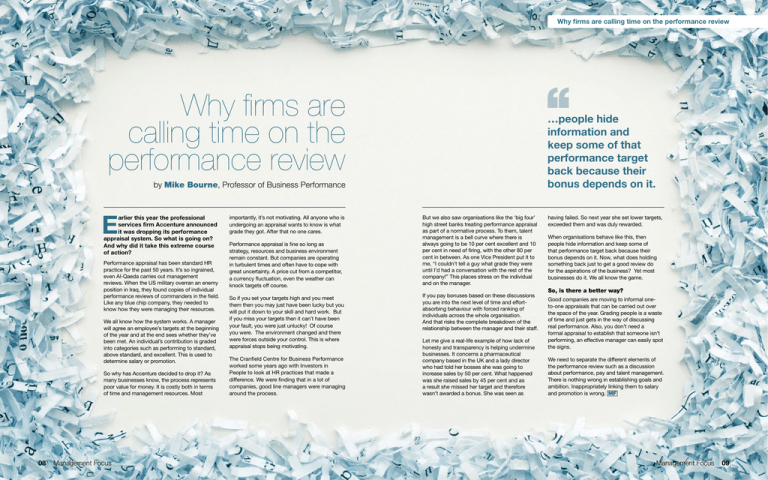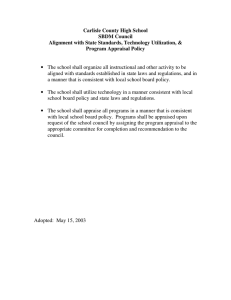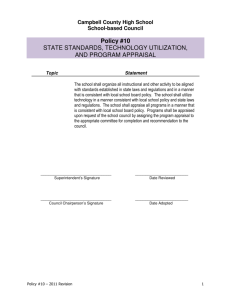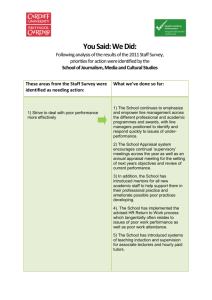Why firms are calling time on the performance review E
advertisement

Why firms are calling time on the performance review Why firms are calling time on the performance review …people hide information and keep some of that performance target back because their bonus depends on it. by Mike Bourne, Professor of Business Performance E arlier this year the professional services firm Accenture announced it was dropping its performance appraisal system. So what is going on? And why did it take this extreme course of action? Performance appraisal has been standard HR practice for the past 50 years. It’s so ingrained, even Al-Qaeda carries out management reviews. When the US military overran an enemy position in Iraq, they found copies of individual performance reviews of commanders in the field. Like any blue chip company, they needed to know how they were managing their resources. We all know how the system works. A manager will agree an employee’s targets at the beginning of the year and at the end sees whether they’ve been met. An individual’s contribution is graded into categories such as performing to standard, above standard, and excellent. This is used to determine salary or promotion. So why has Accenture decided to drop it? As many businesses know, the process represents poor value for money. It is costly both in terms of time and management resources. Most 08 Management Focus importantly, it’s not motivating. All anyone who is undergoing an appraisal wants to know is what grade they got. After that no one cares. Performance appraisal is fine so long as strategy, resources and business environment remain constant. But companies are operating in turbulent times and often have to cope with great uncertainty. A price cut from a competitor, a currency fluctuation, even the weather can knock targets off course. So if you set your targets high and you meet them then you may just have been lucky but you will put it down to your skill and hard work. But if you miss your targets then it can’t have been your fault, you were just unlucky! Of course you were. The environment changed and there were forces outside your control. This is where appraisal stops being motivating. The Cranfield Centre for Business Performance worked some years ago with Investors in People to look at HR practices that made a difference. We were finding that in a lot of companies, good line managers were managing around the process. But we also saw organisations like the ‘big four’ high street banks treating performance appraisal as part of a normative process. To them, talent management is a bell curve where there is always going to be 10 per cent excellent and 10 per cent in need of firing, with the other 80 per cent in between. As one Vice President put it to me, “I couldn’t tell a guy what grade they were until I’d had a conversation with the rest of the company!” This places stress on the individual and on the manager. If you pay bonuses based on these discussions you are into the next level of time and effortabsorbing behaviour with forced ranking of individuals across the whole organisation. And that risks the complete breakdown of the relationship between the manager and their staff. Let me give a real-life example of how lack of honesty and transparency is helping undermine businesses. It concerns a pharmaceutical company based in the UK and a lady director who had told her bosses she was going to increase sales by 50 per cent. What happened was she raised sales by 45 per cent and as a result she missed her target and therefore wasn’t awarded a bonus. She was seen as having failed. So next year she set lower targets, exceeded them and was duly rewarded. When organisations behave like this, then people hide information and keep some of that performance target back because their bonus depends on it. Now, what does holding something back just to get a good review do for the aspirations of the business? Yet most businesses do it. We all know the game. So, is there a better way? Good companies are moving to informal oneto-one appraisals that can be carried out over the space of the year. Grading people is a waste of time and just gets in the way of discussing real performance. Also, you don’t need a formal appraisal to establish that someone isn’t performing, an effective manager can easily spot the signs. We need to separate the different elements of the performance review such as a discussion about performance, pay and talent management. There is nothing wrong in establishing goals and ambition. Inappropriately linking them to salary and promotion is wrong. MF Management Focus 09



